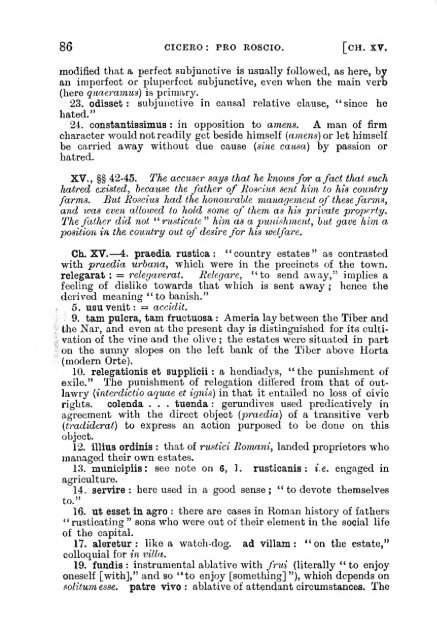Pro S. Roscio Amerino
Pro S. Roscio Amerino
Pro S. Roscio Amerino
You also want an ePaper? Increase the reach of your titles
YUMPU automatically turns print PDFs into web optimized ePapers that Google loves.
86 CICEEO : PRO EOSCIO. [CH. XV.<br />
modified that a perfect subjunctive is usually foUowed, as here, by<br />
an imperfect or pluperfect subjunctive, even when the main verb<br />
(here qaaeramus) is primary.<br />
23. odisset : subjunctive in causal relative clause, "since he<br />
hated."<br />
24. constantissiinus : in opposition to amens. A man of firm<br />
character would not readily get beside hiraself {amens) or let himself<br />
be carried away without due cause {sine causa) by passion or<br />
hatred.<br />
XV., §§ 42-45. The accuser says that he hnowsfor afact that such<br />
hatred existed, because the father of Roscius sent him to his country<br />
farms. But RosrAus had the honourable management of these farms,<br />
and ivas even allowed to hold some of them as his private property.<br />
Thefather did not "rusticate" hi^n as a punishment, but gave him a<br />
position in the country out of desire for his welfare.<br />
Ch. XV.— 4. praedia rustica : "country estates" as contrasted<br />
witli praedia urbana, which were in the precincts of the town.<br />
relegarat : = relegaverat. Relegare, "to send away," implies a<br />
feeling of disUke towards that which is sent away ; hence the<br />
derived meaning " to banish."<br />
, 5. usuvenit: = accidit.<br />
I<br />
[; 9. tam pulcra, tam fructuosa : Ameria lay between the Tiber and<br />
rthe Nar, and even at the present day is distinguished for its culti-<br />
the estates were situated in part<br />
I vation of the vine and the olive ;<br />
lon the suimy slopes on the left bank of the Tiber above Horta<br />
' (modern Orte).<br />
10. relegationis et supplicii : a hendiadys, "the punishment of<br />
exile." The punishment of relegation ditfered from that of outlawry<br />
{interdictio aquae et ignis) in that it entailed no loss of civio<br />
rights. colenda . . . tuenda : gerundives used predicatively in<br />
agreement with the direct object {praedia) of a transitive verb<br />
{tradiderat) to express an action purposed to be done on this<br />
object.<br />
12. illius ordinis : that of rxistici Romani, landed proprietors who<br />
managed their own estates.<br />
13. municipiis: see note on 6, 1. rusticanis : i.e. engaged in<br />
agriculture.<br />
14. servire : here used in a good sense ; " to devote themselves<br />
to."<br />
16. ut esset in agro : there are cases in Roman history of fathers<br />
" rusticating " sons who were out of their element in the social life<br />
of the capital.<br />
17. aleretur : like a watch-dog. ad villam : "on the estate,"<br />
coUoquial for in villa.<br />
19. fundis : instrumental ablative with frui (literally " to enjoy<br />
oneself [with]," and so "to enjoy [something] "), which depends on<br />
solitumesse. patre vivo : ablative of attendant circumstances. The

















